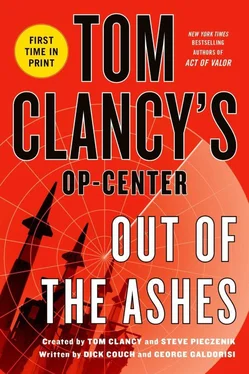“You’re right, Mr. President, but when we were convinced these missiles were in Syria we admitted to ourselves Syria didn’t have complete control of her territory and a terrorist group could operate there with near impunity.”
“Yes, I know, but Saudi Arabia hasn’t had to deal with a civil war. They don’t have any issues controlling their own territory, and they certainly aren’t harboring any terrorist groups.”
“True, Mr. President, but Saudi Arabia is more than ten times the size of Syria. Most of the country is trackless desert. Other than where the oil fields are, much of that desert is someplace no one in the country ever cares about, let alone flies over or drives through. Our analysis tells us someone — we don’t know who yet — could set something like this up in Saudi Arabia for reasons that still elude us.”
“Well, Saudi Arabia is our ally. I can ask the king to send his forces to that area to resolve this. He could do that right now.”
“Mr. President, respectfully, sir, you know the Saudis have a long history of being less than candid with us about their actions.”
“Yes, I’m aware of some of that history.”
“Sir, I saw that in spades during my years as CENTCOM commander. Also now, in the wake of the United States criticizing the Saudis for suppressing their own people during the Arab Spring and their sending troops to Bahrain to squelch protests there, we have to recognize relations between our two nations may be at an all-time low. Even if the king agreed to do what you asked him, and he might not, he could slow roll you and not move out quickly enough. You also have to remember, the Saudis have their pride. Would they even admit some rogue element could erect a site like that on their soil?”
“I see your points, but I’m going to have to take this to my national security team. The stakes couldn’t be higher and we’ve got to think about protecting American sailors on our ships like Truman . I know this is more than a hunch on your part, and I realize you wouldn’t have come to me if that’s all it was, but I’m reluctant to call a halt to all the plans and forces we’ve put in motion.”
“I’m not asking you to do that, Mr. President. I understand your position completely, but I am aware the CENTCOM commander, General Albin, is still moving assets into position and there is flexibility in when he makes his move.”
“Maybe some, but not that much, Chase. You say there’s an analyst at the National Reconnaissance Office who says this site is in Saudi Arabia. This is a lot to put on what one analyst says.”
“Fair enough, Mr. President, but as you know, I’ve surged my JSOC team into western Iraq. They’re operational. Give me eighteen hours to allow the team to get eyes-on and boots on the ground where we suspect this site is in Saudi Arabia. If it is there we can stop what is about to happen with Syria.”
“You understand the logistics of getting ready to strike Syria are just too intense to completely stop, then start again. We have to keep moving forward, and eighteen hours is a long time to wait given the dire situation.”
“My team is trained and ready to go, Mr. President, and if we can pull it off in less than eighteen hours we’ll certainly do that.”
“You also know we’ve got this threat of Iran moving to mine the Strait of Hormuz.”
“I’m not asking you to hold back on anything General Albin needs to do to stop the Iranians. We all know how catastrophic that would be, especially since it would trap so many Navy ships inside the Gulf. Believe me, Mr. President, as a former CENTCOM commander, I fully appreciate his situation.”
“All right, Chase. Get your JSOC team moving to resolve this. We don’t have any time to lose.”
* * *
Sandee Barron had indulged herself with a “Hollywood shower.” She took a shower that at home was considered normal, but on a Navy ship, where every ounce of fresh water has to be distilled from salt water, was considered excessive. It was a waste of a precious asset.
Yet she needed it, just this once. As she thought about what Laurie was asking of her, the full magnitude of it hit her as hard as the hot water that pounded down from the shower head. It was nothing short of putting her life and her career on the line. How could Laurie ask her to do this? It was beyond the pale — or was it?
Sandee turned off the shower. She reflected on her first day at the Naval Academy, standing in Tecumseh Court with 1,100 other new plebes on that steamy June day in Annapolis. They all had their right hands raised as the Naval Academy superintendent swore them in as midshipmen and future Navy or Marine Corps officers. That oath now played back in her brain’s frontal lobe. In light of that, there really was no decision to make; there was only her duty and only one right thing to do. She looked at her watch, the plan forming in mind. So, let’s get this thing done .
* * *
The president was still absorbing what Chase Williams had just told him when Trevor Harward entered the Oval Office. While Williams had insisted on the right to communicate solely with the president when necessary, this was not one of those times. He knew Harward would be key to slowing down moves against Syria, so he back-briefed the national security advisor immediately after leaving the Oval Office.
It had not started out as a pleasant meeting. Harward had gone on the offensive and given Williams a half dozen reasons why the forces put in motion to neutralize Syria’s ability to use her DF-21D missiles against U.S. forces in the region had to adhere to a strict timeline. He told Williams General Albin had used another hastily deployed Global Hawk to fly over the suspected missile site in Syria at a lower altitude and that flight had revealed a covered-up and camouflaged blockhouse, a clear sign that Syria once had a missile site there but had evidently redeployed it somewhere else. Williams had listened, and listened intently, and then carefully used his three-plus decades of military experience, and especially his years as CENTCOM commander, to explain to Harward how what he was proposing to the president would in no way derail General Albin’s preparations. At the end of the meeting all the two men could agree on was they saw things differently, perhaps vastly so.
Now Harward stood in front of the president’s desk, having declined the president’s invitation to sit down. Wyatt Midkiff could tell he was seething. He let him pour out what was on his mind. Finally, his national security advisor stopped talking.
“Trevor, I don’t need to remind you I have complete confidence in your judgment. You also know that I respect the counsel of Jack Bradt and Adam Putnam, to say nothing of General Albin and the rest of our military. I know you are firmly behind the plans to move against Syria immediately—”
“And then Iran, Mr. President,” Harward interrupted. “We’ve got missiles in Syria that are clearly getting moved around like a peas under walnut shells. You also know if Iran does even a half-assed job of mining the strait we’ve got a dozen ships and somewhere north of fifteen thousand sailors trapped there. We’ve got to move, Mr. President.”
“Trevor, before we agreed to stand up Op-Center again and put Chase in charge, you told me above all else, I needed to trust him. I need to trust him on this. He’s going to either find out, or rule out, whether those missiles are in Syria.”
“As you wish, Mr. President,” Harward replied. There was an uncomfortable silence before Harward turned and left the Oval Office.
Wyatt Midkiff made no attempt to call Harward back or assuage him. He needed his national security advisor to do that himself. For now, he was putting his chips, and maybe his presidency, on Op-Center.
Читать дальше












